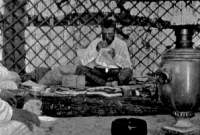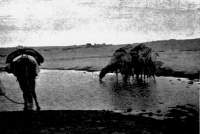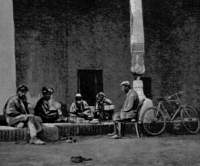 |
Jefferson was an enthusiastic cyclist. Inspired by Frederick Burnaby's account of his ride on horseback to Khiva, he decided to cycle to Khiva from London. Determined all the more because people said it couldn't be done, he managed to complete the 6,000-mile journey by bicycle with less than 100 miles of the journey made by ship and camel.
In 1899 he began his trip with a cheery farewell from various cycling clubs and juddered his way across the cobbled streets of Europe. These roads were just a foretaste of the much rougher roads of Russia and, later, simple dirt tracks. His sturdy Rover bicycle amazingly survived the ordeal, despite numerous punctures and nearly cycling off a gorge one night.
As he cycled south through Russia, Jefferson managed to endure the blazing heat and the arid landscape. However, this was not all he had to contend with.
'I perceived what at first looked like a big, black wave of water rolling along towards me with great rapidity. Bigger and bigger it grew, mounting higher and higher as it advanced... A presentiment that something was going to happen possessed me, and seizing my bicycle I mounted with all rapidity and sped back in the direction of the village. Nearer and nearer came the cloud, now so high and sinister, while louder and louder had the moaning become. The top of the cloud bent over and circled under. The next moment it was upon me. With a roar, a boom, the great wave enveloped myself and my bicycle. It was not rain, it was sand. Instantly everything was a seething, roaring whirlpool. I was swept off my bicycle like a straw and lay on the ground gasping and choking. I just managed to save my hat 'ere it was carried away forever. To say that I was filled with terror would be to convey but a faint idea of my feelings at this juncture.'
 |
Jefferson survived the storm, but still had the formidable Kyzlkum Desert to contend with. Water and provisions would be unavailable during his desert trek, and he would also need a guide to lead him to the various oases, as well as protection from Turkoman raiders. He soon accumulated an impressive caravan, and in the wake of his bicycle followed a tarantas (Russian cart) and driver carrying his 24 melons and sack of flour; six camels to carry water, two Kirghiz guides, three Cossaks and three local soldiers. They were also accompanied by a mobile larder of 12 sheep.
'I feel sure that the members of my party looked upon me as a sort of magician. It was impossible to explain to them how I kept my equilibrium, and when one of them tried the machine, and came off with a sounding thump on the hard ground it was equally voted an instrument which no true Mohammedan ought to have anything to do with.'
However, despite his supernatural cycling abilities and pre-planning of the desert trip, Jefferson was still in for a particularly nasty surprise:
'I think I must have fallen asleep, but I certainly do remember picking
from my face what looked like an enormous spider. I thought nothing of
it until I began to feel pain underneath my left eye, similar to that
left by a mosquito sting. In ten minutes my cheek had become enormously
swollen. By the time Bekel came up my face was so swollen so much that
I could not see out of the left eye. As soon as Bekel saw me and noticed
my face he was stricken with terror.
He leapt from his horse, knocked rather than pushed me down, and with
the fingers on both hands commenced pressing down the protuberance which
had grown under my left eye. The pain was terrible and I yelled in my
agony, until I think I must have fainted, although I well remember one
of the Kirghiz coming with a long knife, when at once the idea entered
my brain that they intended to kill me.
The knife, however, was only used to extract the sting of the tarantula
which had bitten me. It was not until I reached Petro-Alexandrovsk and
related the incident to the doctor that I understood that it was to the
promptitude of Bekel and the Kirghiz that I owed my life. Another hour
and it would have been too late.'
 |
Having almost lost his life, Jefferson finally arrived in Khiva only to find himself and his bicycle a general laughing-stock. On entering the outskirts of the city, a group of Khivan men began to hoot with derision, which was swiftly followed by a sound flogging by the Khan's emissary who was furious at such insolence.
Isfandir Khan granted Jefferson an audience, which proved problematic as Jefferson had no suitable clothes to wear for such an occasion. In the end, he was dressed up in Khivan costume by his interpreter and the Khan asked after his health, wives, sheep, oxen and children.
'I presented, I think, a fairly passable appearance, although my greatest difficulty was to use my hands. The long costume of the Khivans possess sleeves nearly double the ordinary length.'
Despite his audience with the Khan, Jefferson took an instant dislike to Khiva and could hardly wait to leave, referring to it as,
'A sore in more senses than one, it is a stench which the wholesome desert surrounding could well do without... I had read Burnaby and several other writers who have visited the city in recent years, but my first glimpse convinced me of one thing; that I saw Khiva in a far different state to that which it presented itself to them. The suggestion of a doctor in Petro-Alexandrovsk (modern day Turtkul) that the Russians were simply waiting for Khiva to die out had here ample corroborations and, during the three days I remained in the city, it became patent to me that Khiva is absolutely doomed to obliteration within a few short years.'
Overwhelmed and in culture shock, Jefferson was delighted to discover that a community of German Mennonites lived nearby, and for him their settlement at Okh Mejid was a cultural oasis in a desert.
'I had already become accustomed to the Egyptian-like architecture
of the Sart. But here in this German colony were some forty or fifty small
cottages, German in architecture to the very roofs.
"Would I", asked the housewife, "have a cutlet, some white
bread and butter, some asparagus rather old, but nevertheless, still good?"
I marvelled.'
Despite Jefferson's disdain for Khiva, he returned home a cycling legend and was rewarded with the inevitable publishing offers in London for the resulting book of his journey.
R.Jefferson 'A New Ride to Khiva' 1899
| Historical
Travellers Overview | The Wandering Moor | The Luckless Wool Merchant The Diplomatic Spy | The Hungarian Dervish | The Lone Female The Eccentric Cyclist | The True Blue Captain |